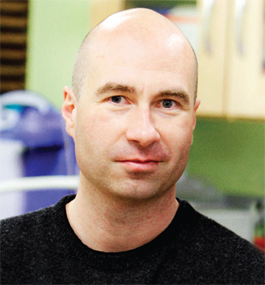Don’t Worry, Be Happy

Mike Lovett
Nicolas Rohleder
by Leah Burrows
Want to live better, and possibly longer? Cut yourself some slack.
New research in psychologist Nicolas Rohleder’s lab suggests self-compassion — for instance, forgiving yourself for events beyond your control, or being able to move on from arguments — is linked to lower levels of stress-induced inflammation.
Researchers know that psychological stress can trigger biological responses similar to the effects of illness or injury, including inflammation. While inflammation can help stave off infection or promote healing, uncontrolled inflammation can lead to cardiovascular disease, cancer or Alzheimer’s.
To understand the link between inflammatory responses to stress and self-compassion, Rohleder, an assistant professor of psychology, and his team asked 41 participants to choose their level of agreement with statements like “I try to be understanding and patient toward aspects of my personality I do not like” and “I’m disapproving and judgmental about my own flaws and inadequacies.”
Then the participants took one stress test a day for two days; their levels of interleukin-6 (IL-6), an inflammatory agent linked to stress, were recorded before and after each test. After the first stress test, participants with higher reported self-compassion had significantly lower levels of IL-6.
On the second day, Rohleder found something unexpected. Those with low self-compassion had higher base levels of IL-6 before the test, suggesting they may have still been carrying the stress they experienced the day before.
“The high responses of IL-6 on the first day and the higher baseline levels on the second day suggest that people with low self-compassion are especially vulnerable to the adverse effects of this kind of stress,” Rohleder says.
This research illustrates how easily stress can build over time and how a seemingly small daily stressor, such as traffic, could affect people’s health if they don’t have the right strategies to deal with it.
“We hope this research can help identify more effective ways to cope with stress and reduce disease, not only by relieving negative emotions but by fostering positive ideas of self-compassion,” Rohleder says.
